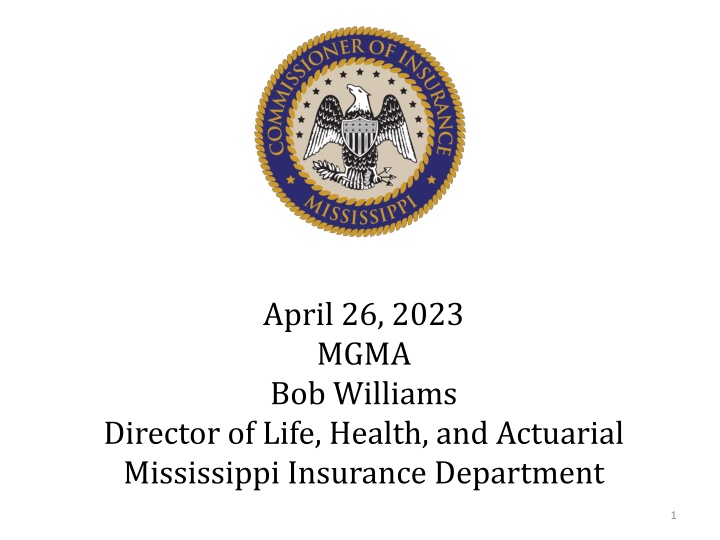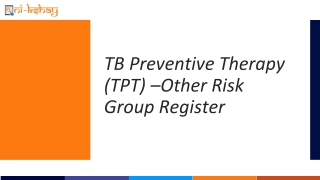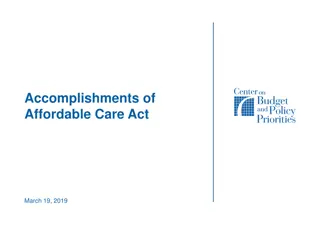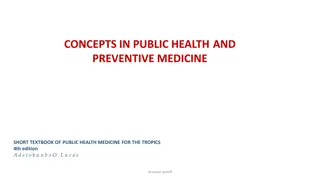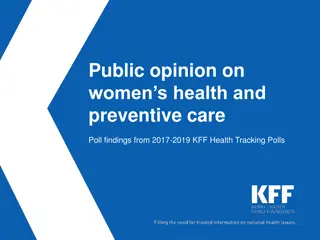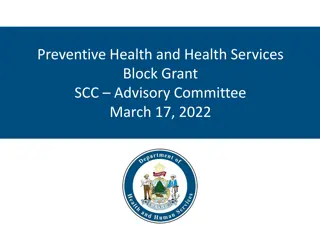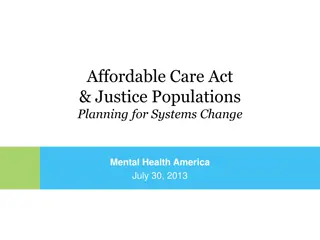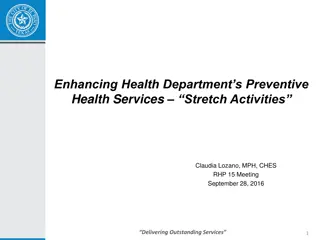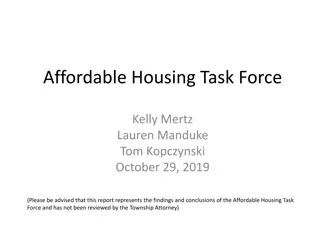The Impact of the Affordable Care Act on Preventive Health Care Services
The Affordable Care Act, enacted in March 2010, aims to make health insurance more affordable, expand Medicaid coverage, and support innovative medical care delivery methods. It has significantly increased access to preventive services without cost-sharing for millions of Americans, leading to improvements in colon cancer screening, vaccinations, contraception use, and chronic disease screening. Recently, a major court decision questioned the recommendations for preventive care treatments under the ACA.
Download Presentation

Please find below an Image/Link to download the presentation.
The content on the website is provided AS IS for your information and personal use only. It may not be sold, licensed, or shared on other websites without obtaining consent from the author.If you encounter any issues during the download, it is possible that the publisher has removed the file from their server.
You are allowed to download the files provided on this website for personal or commercial use, subject to the condition that they are used lawfully. All files are the property of their respective owners.
The content on the website is provided AS IS for your information and personal use only. It may not be sold, licensed, or shared on other websites without obtaining consent from the author.
E N D
Presentation Transcript
April 26, 2023 MGMA Bob Williams Director of Life, Health, and Actuarial Mississippi Insurance Department 1
Affordable Care Act The Patient Protection and Affordable Care Act, referred to as the Affordable Care Act or ACA for short, is the comprehensive health care reform law enacted in March 2010. The law has 3 primary goals: 1) Make affordable health insurance available to more people. The law provides consumers with subsidies ( premium tax credits ) that lower costs for households with incomes between 100% and 400% of the federal poverty level (FPL). 2) Expand the Medicaid program to cover all adults with income below 138% of the FPL. Mississippi is one of the very few states that have not expanded Medicaid. 2
Affordable Care Act 3) Support innovative medical care delivery methods designed to lower the costs of health care generally. The ACA substantially increased access to care and coverage of preventive services without cost-sharing for millions of Americans. Many preventive services including, vaccinations, well-child visits, screening for HIV and sexually transmitted infections, HIV pre-exposure prophylaxis, contraception, and cancer screening were 3
Affordable Care Act required to be covered by most group and individual health plans and for many Medicaid beneficiaries without cost- sharing. An HHS analysis of recent data indicates that more than 150 million people with private insurance including 58 million women and 37 4
Affordable Care Act million children currently can receive preventive services without cost-sharing under the ACA, along with approximately 20 million Medicaid adult expansion enrollees and 61 million Medicare beneficiaries that can benefit from the ACA s preventive services provisions. Evidence from studies examining the impact of the ACA indicate increased colon cancer screening, vaccinations, use of contraception, and chronic disease screening. . 5
Major Court Decision On March 30, 2023, US District Judge Reed O Connor struck down the recommendations that have been issued by the US Preventive Services Task Force, which is tasked with determining some of the preventive care treatments that the Affordable Care Act (ACA) requires to be covered. This will only apply to preventative care recommendations adopted after 2010 (When ACA was enacted). 6
Major Court Decision Specifically, this ruling states that some ACA mandates cannot be enforced nationwide, including those that require insurers to cover a wide array of preventive care services at no cost to the patient, including some cancer, heart and STD screenings, and tobacco programs. 7
Major Court Decision O Connor s ruling comes after the judge had already said that the task force s recommendations violated the Constitution s Appointments Clause. The Judge also deemed unlawful the ACA requirement that insurers and employers offer plans that cover HIV-prevention measures such as PrEP for free. The Justice Department filed a notice of appeal on March 31, 2023, although they have not yet requested a stay. The Biden administration is also appealing O Connor s earlier ruling that the task force s recommendations violated the Constitution s Appointments Clause 8
Major Court Decision Impact In accordance with the ACA, insurers must cover evidence-based services for adults that have a rating of A or B in the current recommendations of USPSTF, an independent panel of clinicians and scientists commissioned by the federal Agency for Healthcare Research and Quality. An A or B letter grade indicates that the panel finds there is high certainty that the services have a substantial or moderate net health benefit. 9
Major Court Decision Impact It is still unclear what the lasting implications of this decision will be; however, experts fear it could have disastrous consequences. "This is not just about PrEP. It's much broader," Katie Keith, a health law expert at Georgetown University told Axios. "If we lose the A or B recommendations, then any employer or plan, religious objection or not, could say we're not going to cover that anymore. 10
Major Court Decision Impact Jonathan Adler, a Case Western Reserve University law professor, agrees. The ruling suggests "self-insuring employers could pick and choose what they want to cover based on religious objections to certain types of coverage. "Adding an additional barrier to so many essential medical services is only going to make things worse and it's going to make things disproportionately worse for the most vulnerable," Mark Fendrick, director of the University of Michigan Center for Value-Based Insurance Design told Axios. 11
POSTPARTUM MEDICAID On February 7, 2023, Mississippi s Senate passed legislation that would extend postpartum coverage for 12 months; legislation passed the House on March 7, 2023. Postpartum Medicaid extensions in these states include continuous eligibility during the postpartum coverage period. On March 7, 2023, the House sent Governor Tate Reeves a bill to extend postpartum Medicaid coverage for new mothers in Mississippi from 60 days to a year. 14
POSTPARTUM MEDICAID What is included in postpartum care? The comprehensive postpartum visit should include a full assessment of physical, social, and psychological well-being, including the following domains: mood and emotional well-being; infant care and feeding; contraception, and birth spacing; sleep and fatigue; physical recovery from birth; chronic disease . . . 15
Mississippi Prior Authorization Reform Act 2023 Legislative Session (S.B. 2622) The Prior Authorization process is used by Health Insurers to determine the medical necessity and medical appropriateness of an otherwise covered health care service before the service is actually provided. The process generally requires medical records and physician documentation to show why a procedure was chosen and is medically necessary. 17
Mississippi Prior Authorization Reform Act Medical Providers have complained for some time about the challenges and frustrations they have experienced when working through the prior authorization maze with health insurers. They say that the process ties up administrative staff in hospitals and clinics and also takes physicians and other practitioners away from providing care to their patients. 18
Mississippi Prior Authorization Reform Act On the other hand, I think most would agree that the Prior Authorization process, when administered efficiently and fairly, is an important tool that can be used by insurers to ensure that medical services are provided in the most cost-efficient manner possible without unduly interfering with the medical judgment and decision making of the provider. All things considered, it is MID's position that the process can be better and there is room for improvement. 19
Mississippi Prior Authorization Reform Act So S.B. 2622 would have prescribed certain reforms to tighten up the PA process. This was not a Dept. of Insurance MID Bill, but we did speak in support of the Bill (It was a Bill heavily supported by segments of the medical community). Despite overwhelming support in both the House and Senate, SB 2622 was vetoed by the Governor. 20
Mississippi Prior Authorization Reform Act There were several concerns expressed by the Governor in the Veto Message. The Bill characterizes PA as falling under Utilization Review activities, and places PA under the regulatory authority of the MS State Dept. of Health. So the Veto Message says that MID regulates insurance, and the Dept. of Health has no experience in regulating health insurance companies. However, PA, which falls under the umbrella of UR, has been regulated by the Dept. of Health since 1990, and the Health Dept., since 1995, has had a role in regulating HMOs. So the supporters of the Bill felt like the Health Dept. was the proper regulatory authority. 21
Mississippi Prior Authorization Reform Act There was also a provision in SB 2622 that directed health insurers to notify the Commissioner of Insurance if an insurer suspected a provider had submitted fraudulent requests for PA, and the Commissioner would then be required to conduct an Administrative Hearing to resolve the issue. The Veto Message states that MID plays no role in investigating suspected healthcare fraud. Of course, we disagree with that premise a bit, because we do have a long history of successfully addressing all types of insurance fraud. MID doesn't have criminal authority, but we do have civil authority to investigate and bring enforcement actions - and we work with law enforcement agencies collaboratively to prosecute criminal activities. 22
Mississippi Prior Authorization Reform Act SB 2622 would have required that in those cases where a PA request is denied, the denial would have to be reviewed by a physician with experience treating the condition in question, and who is board certified in the relevant specialty. Currently, there is no requirement that an appeal be reviewed by a physician qualified in the particular specialty in question. The Veto Message expressed concern that this could increase costs. 23
Mississippi Prior Authorization Reform Act Interestingly, during the floor vote on this Bill, a Senator testified that the Senator's spouse had an ongoing medical condition, and needed to have a specialized test. There was another less costly test available, but the specialist determined it was not the best course of treatment in that particular situation. A pediatrician working for the insurer, without any experience in the specialty involved, reviewed the case and upheld the insurer's PA denial. Cases like this resulted in the Peer to Peer provision being placed in the Bill. 24
Mississippi Prior Authorization Reform Act The original version of the Bill contained a Gold Card or Exemption provision which would allow providers meeting certain criteria to be exempt from PA requirements for 6 month intervals. The Gold Card provision seemed to generate a lot of controversy among the industry and this provision was deleted. 25
Mississippi Prior Authorization Reform Act In fairness, the Veto Message did state that the PA process is in need of reform, so I do think we will see this Bill come back next year. And that is why I wanted to mention it-reform of the Prior Authorization process is not going to go away. Last week, United Healthcare, (UHC) spelled out changes to its PA process and even indicates an internal Gold Card provision; which tightens up their processes. 26
S.B. 2224 Timely Payment of Claims I also wanted to mention S.S. 2224, which was the second healthcare related Bill that was vetoed by the Governor This Bill would have addressed two primary issues: 1) First, the Bill would have given MID the ability, through the examination process to gather data and information from insurers and medical providers to determine the extent of differences in reimbursement rates among medical providers, especially when comparing rates between MS providers and out-of- state providers. Then, upon identifying the nature and extent of these differences, SB 2224 would have 27
S.B. 2224 Timely Payment of Claims have allowed the Commissioner to bring all stakeholders to the table to explore the adoption of rules and regulations designed to ensure that MS providers are treated fairly and MS consumers have continued access to the highest quality healthcare available. 28
S.B. 2224 Timely Payment of Claims (2) Secondly, the Bill would have made changes to the timely pay requirements applicable to health insurance claims. 29
S.B. 2224 Timely Payment of Claims Consumers and medical providers have complained that some insurers delay the payment of claims by continuing to ask for additional information, which means the claim doesn't achieve clean claim status and the timely pay period doesn't run. So S.B. 2224 would have required that upon request by a consumer or medical provider, an insurer would have to provide a written list of the information required for the insurer to deem a claim to be clean, and the insurer would then be bound by the list. 30
S.B. 2224 Timely Payment of Claims In addition, current law says that a claim submitted by a provider more than 30 days after the date of service is not a clean claim. The Dept. has received complaints indicating that where a patient is undergoing a 30- day course of treatment, the insurer takes the position that the 30-day period starts to run on the first day of treatment, so that the claim has to be filed before the treatment is complete. S.B. 2224 would have clarified that the claim has to be filed by the provider within at least 30 days after the date of completion of the service. 31
S.B. 2224 Timely Payment of Claims The Veto Message didn't mention the revisions to the Timely Pay Statute, but the Message did express concern that the Bill would make the Commissioner the Rate Czar for healthcare in MS by giving him the authority to set reimbursement rates for providers. 32
S.B. 2224 Timely Payment of Claims I can tell you it was not MID's intent through this Bill to mandate what insurers have to pay providers. We simply wanted authority to gather data and information and explore the extent of differences between what MS providers are paid vs. what providers are paid in other states and consider whether there are justifiable reasons for those differences. If there are reasonable 33
S.B. 2224 Timely Payment of Claims steps that can be taken to mitigate protracted provider contract disputes in the future, then that at least ought to be explored. Parties participate in mandatory arbitration to resolve differences if can't resolve within 3 months; give the Department greater authority to get involved in these disputes in an effort to help them reach an agreement.] At any rate, the Bill did fail. 34
E-Commerce In the 2022 Session, the Legislature passed an E- commerce Insurance law that allows an insurer to send E-documents and notifications to policyholders electronically, if the insured opts in to that electronic communication process. This law applies to all lines of insurance. 36
E-Commerce H.B. 1190, which passed in the 2023 Session and which has been signed by Governor Reeves, will allow Plan Sponsors of a Health Benefit Plan to consent to electronic mailing of notices and documents on behalf of all covered persons. So the Plan Sponsor consents, then the insurer must give the covered person an opportunity to opt out. If the covered person does not opt out, then he or she will receive their policy information electronically. 37
E-Commerce Stated another way, this moves an employee or participant under a Health Benefit Plan from a position of opting-in, to the position of having to opt- out. Plan Sponsor is defined in the Bill as a person, other than a regulated entity, who establishes or maintains a health benefit plan that covers MS residents. So this would include, for example, employer plans, Association Health Plans, and plans established by a Board of Trustees. This Bill will become effective on July 1st of this year. 38
By The Numbers Medicare 612,000 Estimated Insured: 2,749,000 BCBS 957,000 Estimated Uninsured: 250,000 Medicaid 855,000 ACA 105,000 UHC / Others 120,000 BCBS (Includes State & Federal) United and others ACA Medicaid Medicare 39
Supplemental Health Care Exhibit # of Covered in Mississippi (As of 12/31/2021) I am going to review some of the data from the Supplemental Health Care Exhibit, showing the number of covered lives in Mississippi as of December 31, 2021. First, look at the State s largest carrier, Blue Cross and Blue Shield of Mississippi. This Company has over 33,000 policyholders with individual coverage, over 78,000 policyholders with small group coverage, over 167,000 policyholders with large group coverage, and over 632,000 individuals with Self-funded plans. All total, the Company is covering or administrating policies for over 957,000 individuals. 40
Supplemental Health Care Exhibit # of Covered in Mississippi (As of 12/31/2021) The second largest carrier is UnitedHealthcare (UHC). UHC has over 4000 policyholders with individual coverage, over 5000 policyholders with small group coverage, over 400 policyholders with large group coverage, over 187,000 in government programs like MissCan, over 50,000 with Medicare Supplement and Medicare Advantage. All total, UHC is covering or administering over 369,000 individuals. Magnolia/Ambetter (Centene) has a combination of individuals covered under the Federal Market Place in Mississippi as well as individuals in government programs like MissCan. Magnolia has over 169,000 in MissCan, while Ambetter covers over 77,000 on the Federal Market Place. All total, the company covers over 246,000 individuals in Mississippi. 41
Supplemental Health Care Exhibit # of Covered in Mississippi (As of 12/31/2021) Molina also has a combination of individuals covered under the Federal Market Place in Mississippi as well as in government programs like MissCan. Molina has over 97,000 in MissCan and over 32,000 in the Federal Market Place. All total, the Company covers over 129,000 in Mississippi . Our Data shows that there are over 612,000 Mississippians on Medicare and over 855,000 on Medicaid. 42
Medicaid Enrollees lose Coverage Starting March 31, beneficiaries no longer covered by Medicaid s continuous enrollment requirement can get marketplace plans. At the start of the pandemic, Congress enacted the Families First Coronaviruse Response Act (FFCRA), which included a requirement that Medicaid programs keep people continuously enrolled through the end of the month in which the COVID-19 public health emergency (PHE) ends, in exchange for enhanced federal funding. Primarily due to the continuous enrollment provision, Medicaid enrollment has grown substantially compared to before the pandemic and the uninsured rate has dropped. But, when the continuous enrollment provision ends, millions of people could lose coverage that could reverse recent gains in coverage. 43
Medicaid Enrollees lose Coverage As part of an end-of-the-year spending bill, signed into law on December 29, 2022, Congress set an end to the continuous enrollment provision on March 31, 2023, and phase down the enhanced federal Medicaid matching funds through December 2023. States that accept the enhanced federal funding can resume dis-enrollments beginning in April but must meet certain reporting and other requirements during the unwinding process. The Centers for Medicare and Medicaid Services is opening a special Affordable Care Act enrollment period for beneficiaries losing Medicaid or Children s Health Insurance Program coverage due to the end of the continuous enrollment requirement. 44
Medicaid Enrollees lose Coverage CMS released information on a temporary Exceptional Circumstances Special Enrollment Period from March 31 through July 31. Marketplaces using the federal platform will be providing additional flexibility for eligible consumers to enroll in coverage during and immediately following the end of the Medicaid continuous enrollment condition unwinding period, CMS said. This starts on April 1 as states begin redeterminations. 45
Medicaid Enrollees lose Coverage WHY THIS MATTERS Up to 18 million people are projected to lose Medicaid coverage as the continuous enrollment requirement put in place under the public health emergency ends. The Families First Coronavirus Response Act prevented state Medicaid agencies from disenrolling people during the PHE. The omnibus spending package that passed at the end of 2022 gave states a heads up on Medicaid coverage. Under the bill, states will be able to begin processing Medicaid redeterminations on April 1, whether the PHE is in place or not. 46
Medicaid Enrollees lose Coverage This previously left the question of whether disenrollment from Medicaid met the conditions of a qualifying event to enroll in health insurance under the ACA without waiting for open enrollment to begin in November. CMS s guidance on Friday aims to close the gaps in coverage for a smooth transition from one type of health insurance to another. In the letter, CMS said it is providing flexibilities for states and marketplaces during the unwinding period to help beneficiaries maintain continuity of coverage as they transition off Medicaid or CHIP into a marketplace-qualified health plan. 47
The Crisis in Healthcare What if you had an accident and the closest Emergency Room was over 30 minutes away? What if you were sick and there were no physicians or hospital beds in your community? Millions of Americans live in rural communities that don t have essential healthcare services such as a hospital, an emergency room, or a primary care clinic. They face long delays in getting care if they re in an accident or have symptoms of a heart attack, stroke, or an infectious disease such as COVID-19. Even if they have insurance to pay for health care services, there is nowhere in their community they can use it. 48
The Crisis in Healthcare More than 130 rural hospitals have closed over the past decade, and over 600 additional rural hospitals more than 30% of all rural hospitals in the country are at risk of closing in the near future. Rural hospitals are at risk of closure because they lose money delivering services to patients. In the past, many hospitals have received grants, local tax revenues, or subsidies from other businesses that offset these losses, but there is no guarantee that these funds will continue to be available or sufficient to cover the higher costs hospitals are experiencing. Millions of people could be directly harmed if these hospitals close. 49
The Crisis in Healthcare The Causes of Rural Hospital Problems Rural hospitals are being forced to close because they are not paid enough to cover the cost of delivering care to patients in rural areas. More than half of the small rural hospitals that have closed in recent years had losses of 10% or more in the year prior to closure, and over one-fourth had losses greater than 20%. 50
